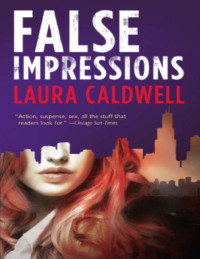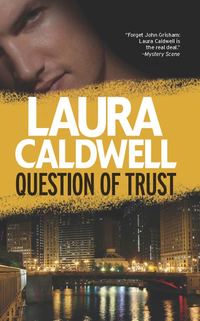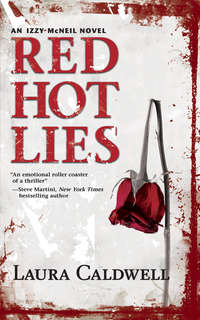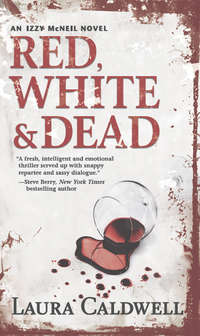
Полная версия
The Good Liar
He nodded. “That’s right. He’s requested step-down status, and running the Twilight Club is the assignment we’ve given him.”
“But you won’t let him out.”
“He can’t be out entirely. You know the rules.”
Liza sighed and turned to face the bar. “God, do I.”
He stepped closer. He could smell the lotion on her skin—scented with vanilla and something a little darker—and he felt himself grow hard. He could have stopped it. Like her, Roger had gotten very good at concealing emotion when he wanted to. But he didn’t want to. Just for tonight, and with someone exactly like Liza, he wanted to let sensation get the better of him. Although she was his subordinate, she was a star in his world. The thought of capturing that star, consuming her, was intoxicating.
“It’s not so bad, is it?” he said.
She stared at her wineglass. “It’s tough. You know how it is.”
“This is your legacy.”
“Sometimes I don’t care.”
“If it helps, I can tell you that the research we’re doing in Chicago is going well. Incredibly well, actually. I’d love to show you sometime.”
Liza gave him a confused look. “I know nothing about that research, and since I’m not involved, you shouldn’t be telling me. That’s protocol.”
He shook his head. “Rules can be bent.” If she only knew how he’d bent the rules.
“Since when?” Liza said.
He stepped even closer, to the side of her now. “I want to make you feel better.”
She looked up at him, and her face shifted to one of surprise. She’d seen his open desire.
“Roger,” she said sternly, dropping the alias, and taking a step back. “Don’t.”
He stepped closer. He could smell that scent again, and it made him want to pin her arms down and bite the side of her long, white neck. “Why not? Why should Michael and Kate get everything?”
“No fraternization. Those are the rules. And you helped make those rules.”
“I’ll break them.”
She gave a short laugh. “Have some respect for yourself. Stop while you’re ahead.”
“Let me make you feel better.”
“Roger, get the fuck away from me.”
The word fuck coming from her mouth made him angry and yet it turned him on even more. He was losing a little bit of control. He saw that. But he liked it. It had been a long, long time.
He grabbed her arm and pulled her toward him. “C’mon. Come back to my hotel.”
“Roger, maybe you’re not understanding. I have no interest in you, I have no interest in your body, and I’d rather spend six months in solitary confinement than go to your hotel room.”
He tightened his grip on her arm. Now she was pissing him off.
She dropped her voice. “If you don’t get your hand off me, I’ll break it. I will break every phalanx and every joint and every metacarpal.”
Just then, one of Kate’s brothers yelled “Liza!” from the end of the bar.
She yanked her arm away and shot them a smile. “Be right there,” she called.
She turned her attention back to him, her features growing stern again. “I’m going to pretend this didn’t happen. And it will not happen again. Do you get that?”
He felt the urge to smash her face with his fist. He was embarrassed now that he’d let her get the better of him, but he would never show her that. He merely gave her a smirk.
Liza tossed her shoulders back and walked to the end of the bar. She accepted a beer from one of Kate’s sisters-in-law and pecked one of the brothers on the cheek.
A minute later, she glanced over her shoulder to see if Roger was still there. He stood, trying to let his anger sift away. She was a star in their world, yes, but the way she treated him, as if he were some commoner, as if he weren’t someone, was inexcusable.
Finally, Roger turned and left the bar. The cobblestone streets of St. Marabel were slick. It must have rained. Roger put his hands in his pockets and headed for his hotel. He’d been able to clear most of his emotions and leave them at the pub—he’d left behind his desire and his momentary lack of control. But he was still carrying one emotion with him. His anger. He was having a very hard time getting rid of that.
10
Chicago, Illinois
L iza Kingsley crossed LaSalle Street at Madison and entered one of the block’s smaller buildings, which bore brass plates by the entrance. Nine of those plates proclaimed the names of local law firms. The other plate read simply, Presario Pharmaceuticals.
“Morning, Ed,” she called to the security guard, as she did every morning she came to the office.
“Morning, miss.”
Liza walked to the elevator and got in with two lawyer types who hit the button for a firm called Toffer and Brodley. She nodded at them and smiled.
“Hey,” one guy said to her, allowing his eyes to linger on her face. Those eyes had also darted down Liza’s body when she stepped inside the elevator. He probably thought she hadn’t noticed. She had.
Liza wore a sleek, black pantsuit, as she did many days at work, but today she’d added a low-cut, salmon-colored silk blouse. Something about seeing Kate and Michael at their wedding last week had made her think that it was about time she found someone to date. Or at least someone to sleep with. She’d spent her weekend deciding that it had been entirely too long.
“How was your weekend?” the guy asked Liza, as if they knew each other.
She turned to face the lawyers. The one who had spoken wore khakis and a blue button-down shirt that matched his eyes precisely. He had brown hair, cut short—typical lawyer fashion—but he had a wicked grin. Liza knew his type. Full of confidence. Full of bravado. Full of himself. And usually very good in bed.
“A little lonely,” she answered.
His grin deepened. “Yeah, me too.”
They stood, their eyes not leaving the other’s face.
“So you work at Presario Pharmaceuticals, huh?”
She nodded.
“What kind of pharmaceuticals do you specialize in?”
The elevator dinged and the door opened to the spacious, ivory-painted foyer of Toffer and Brodley. The other lawyer got out and took off down the hallway.
Her guy stood in front of the doors so they couldn’t close. “I’m Rich Macklin,” he said, holding out his hand.
She shook it. “Liza Kingsley.”
“I’m from Boston, but I work out of this office part-time. Maybe I’ll stop up at Presario and say hi someday.”
“Oh, no, don’t do that.”
His cocky grin faded.
“It’s a zoo, and the receptionist can never find anybody.” She rolled her eyes at the imagined craziness of her office.
He pulled a card out of his pocket. “Well, then, call me when you’re heading downstairs for a coffee sometime, okay? Or whenever. My cell phone number is on there, too.”
“Sure,” she said, taking it from him, liking the tiny race of her pulse.
Even though the number for her floor was already lit, she hit it again. “I’ll see you then.”
“Yeah, I’ll see you.” He gave her that grin again and stepped back.
Liza held Rich Macklin’s card as the elevator climbed. She liked the feel of it—light but with sharp edges. She stepped out when the elevator reached her floor. A large, glass block sign hung in the foyer with heavy, steel letters spelling out Presario Pharmaceuticals. Below that were two visitors’ chairs with an end table between them and a single black phone atop the table.
Liza lifted the phone, which was a STU-III, a secure telephone device designed to take audio signals, mix them digitally into a serial data stream and encrypt the voice. She rattled off a series of letters and numbers. “X68BTY233BR5Y780.”
A door in the side wall, barely perceptible, clicked twice. Liza pushed it open and entered a hallway with thick beige carpeting, the kind that might be seen in Rich Macklin’s law office downstairs. But the offices here weren’t filled with open doors and chatting lawyers. Every door was locked. No sound filtered into the hall.
Liza walked to her office door and held her thumb to the fingerprint pad. When prompted, she punched a different series of numbers and letters into the keypad. She stepped into her office. Its plain white walls surrounded a scruffy but beloved pine desk that had been handed down from her father. Her only adornments were an Oriental rug—plum and olive green—that she’d picked up in China, and two pictures frames, an oval one showing her and Kate at college graduation and one of her family taken in the mid-eighties. In it, her father stood behind Liza, Colby and her mom, his arms stretched out, trying to encircle them. She still thought of her dad that way—trying to hold all of them close, keep all of them safe. It was hard to believe she and her mom were the only ones left.
The phone on the desk made a single buzzing sound. Liza picked it up and held it to her ear without a word.
“Good morning, Liza,” said a female voice.
The voice belonged to a woman who was one of the analysts for the Trust. Her job was to monitor and interpret world events and to notify Trust operatives, like Liza, when those events might be of the slightest interest. But there was usually no “good morning” or “how are you doing” involved in these discussions. Why the formality? Liza wondered.
“Morning,” Liza replied cautiously.
“A small plane went down at the Moscow airport about half an hour ago.”
Liza furrowed her brow, still confused. “Was it carrying any cargo?” Moscow was one of the few Russian cities where Presario actually sold product.
“No.”
“Casualties?”
“Seven. The crew. Four passengers.”
“Anyone we know?”
There was a pause. An odd, surreal pause when the walls of her office seemed to close in one minute and then expand like a balloon the next. Liza swallowed hard. She closed her eyes and opened them.
“Aleksei Ivanov,” the woman answered.
Liza let her weight fall against the chair behind her. She felt as if a cannon had been shot at her insides. “Aleksei?”
Why was she having such a reaction? She hadn’t laid eyes on him in a few years. She sat immobilized then, unable to speak.
But Liza knew why—because Aleksei was different than anyone she had ever known or would ever allow herself to know.
She could imagine him as clearly as the first time they’d met in Rio. She could see those deep green eyes that went from shrewd to laughing in a split second, the perpetually mussed sand-colored hair, the thin, worn leather jacket. And those reporter’s notebooks he was always carrying around. He tried to get her to carry them, too. “For memory,” he said, tapping her gently on the forehead, his green eyes laughing then. She told him she didn’t need help with her memory. But now Aleksei was gone, and she wished she’d filled a notebook with the other details she remembered of him.
Liza struggled to take a breath. “Do we know why the plane went down?”
“No, but the other passengers were journalists, too.”
“Thanks for the call,” she managed to say.
“Of course.”
Liza hung up the phone and left her office just as quickly as she had entered it.
11
Five years earlier
Rio de Janeiro, Brazil
A s a warm blanket of darkness settled over the city, Liza Kingsley drew away from the spotting scope she’d been peering into. She took off the headphones. She stood and stretched, then allowed herself to slump onto the polished wood floor of the apartment. With her back against the outside wall, she stared at the place. Recently, this apartment had been owned by a wealthy Brazilian couple. It was in the Gávea neighborhood—a gentrified area in a city of favelas or shanty towns—but the couple hadn’t been wealthy enough to pass up the insane amount of money Liza offered them through a broker. The couple might have known that they lived directly across the street from João Pedro Franco, a business partner of Luiz Gustavo de Jardim. They would have undoubtedly followed Gustavo’s push for power and occasional threats to run for the presidency. They probably didn’t know that their apartment would be used solely to study and listen to Franco, Gustavo’s main confidant.
Gustavo, along with all of his close associates, was being watched. If ever reelected to the political realm, Gustavo would be in charge of many things other than the value of the real, the Brazilian currency, and the arms dealing he already controlled. Gustavo could eventually control the country’s vast oil resources and its production of fighter jets. It was not a power to be taken lightly. Gustavo was also known for being as corrupt as they come. When he’d been in office once before, it was widely suspected that he’d funneled significant funds meant for AIDS research to dummy companies in his control. Worse, they now had intel that he was taking meetings with different terrorist organizations and promising under-the-table sales of fighter jets, along with private aircraft. These terrorist organizations had been quietly searching for such jets for years, hoping to fill them with explosives and use them as flying bombs to attack the United States.
The Trust was attempting to determine whether such intel was correct, and if Gustavo meant to keep his promises once in office or if he was just shooting off his mouth. And so somewhere across the city, Gustavo’s house and office were under surveillance, while Liza watched his buddy, Franco (and his wife, kids, housekeeper and cook). In reality, Liza mostly listened to the conversations of all these people through the bugs they’d placed in Franco’s house. Like many of Rio’s nicest homes, Franco’s was built around an internal courtyard, invisible to the front, with only one window facing the street.
And so now across the street from Franco the newly purchased apartment had been bled dry of personal effects, and family memories and color, and it was filled with the cool blacks and silvers of surveillance equipment. Liza felt this apartment was somehow a metaphor of her own life, the way it was taken up with work and work only.
Before the light completely disappeared, Liza roused herself, packed away her scope and replaced it with an ATN night-vision scope. She returned the headphones to her ears. As she focused the scope across the street, watching for any visitors to Franco’s home, she saw a man approach the house, stop briefly to adjust his shoe, then move on down the street.
Liza refocused the scope and watched his retreating figure. The man had hair that was messy, as if he’d just roused himself from bed. He wore jeans and a lightweight leather jacket, despite the sticky heat. She’d seen this guy before, sometime yesterday. She remembered because of the jacket. Was he simply a neighbor? But he didn’t look Brazilian, nor did he look like he could afford the neighborhood.
Liza brought the scope back to the house and stared at the spot where the man had squatted to adjust his shoe. A knowing smile took over her face.
She left the apartment, locking the four double-cylinder dead-bolts and punching in the numbers on the keypad to arm the fingerprint-ID lock, all of which had been installed after the purchase of the apartment. She left the building and crossed the street, walking quickly past Franco’s house, then turned at the end of the block and walked back the same way. On the second pass, she saw what she was looking for—a rock in the tiny front lawn, right by a post of the black iron fence. She bent slightly and scooped up the rock. She took it upstairs with her and settled into an interior room with no windows, where she flicked on the lights.
She studied the rock, then turned it over and saw the false bottom. She smiled again as she removed it. A tiny camera had been installed, no doubt to take photos of guests arriving at Franco’s house. The rock was simple in design, the color too uniform to look real. If Gustavo and his crew were already in power, with a large security detail in place, the device would have been discovered easily.
She switched off the lights, left the apartment again and walked one block away. She hid herself in a dark corner of an alley where she had a half view of the street. She waited for an hour, then another. It was a Friday night, and a few couples strolled home from dinner, tipsy and laughing. She disappeared deeper into the alley at those times. Sometimes it made her feel too lonely to see couples. She hadn’t been a part of one in a long time. Not ever in her adult years, if she admitted it.
Her loneliness had been hammered home a few weeks ago when Kate had married Scott, who was a friend of theirs from high school. Scott was a decent enough guy, both in looks and personality, but in Liza’s opinion he wasn’t a match for Kate’s wit and smarts. Maybe Liza was just being protective, or maybe she simply felt the sting of still being single—and very much alone—while her best friend charged into marriage and family.
After another hour from her vantage point in the alley, Liza saw what she was looking for, the man in the leather jacket. She’d had a feeling he’d be back sometime tonight. Franco often had people over for drinks on Fridays, and the man probably expected his little rock to have taken a few snapshots of the guests. She watched, amused, as the man ambled by Franco’s place, then did his bend-and-adjust-shoe technique. But this time, he didn’t rise as quickly. She saw his hand dart onto the lawn, grasping for an object that was no longer there.
He had the sense not to linger and was soon walking the other way. Liza tailed him until he reached a busy avenida. She came closer to him. The noise from the restaurants and bars hid the sound of her footfalls. Soon they were shoulder to shoulder.
He stopped abruptly and turned to her. “May I help you?” he said in Portuguese, but with a very distinct accent. Russian.
“I think you may have lost something,” she answered in English. She paused to make sure he understood the language and saw from his eyes that he did.
“I think you are mistaken,” he said in English. But there was anxiety in his green eyes.
She flashed the rock at him, then closed her fist and crossed her arms. “You need to come with me.”
He hesitated. His eyes darted toward her arms. He wanted that rock back.
“A few questions, then I give you back what you’ve lost.”
The man glanced around. Liza scanned the crowd with him. Did he have backup? She pulled up her shirt slightly, just enough to show him the pocket Glock tucked in the waistband of her jeans. It was one of the smallest Glocks available, one that could only be handled by the sharpest of shots. Which she was.
At the sight of it, the man’s shoulders drooped and he pressed his lips together. He wasn’t armed.
“I will give you back what is yours,” she said.
“Yes, okay,” he answered.
It turns out, Aleksei Ivanov was a terrible spy. Actually, he wasn’t a spy at all, just a journalist who’d been convinced he could become one.
Ordering him to walk ahead of her, Liza directed the man from the streets of Gávea, into the neighboring favela of Rocinha. The vertical streets were winding and barely shoulder width, lined with shanty-style houses. The sheer volume of people and sounds and smells was overwhelming. The man had clearly never been in Rocinha before, she could tell from the way he flinched at the shouts from the children, many smiling despite their plight.
He looked back at her once, and she could see he was analyzing his chances of bolting. “Keep going,” she said, flashing her Glock again.
The man looked from the pistol to her face, then continued his trudge through Rocinha. They were openly stared at by the residents of the favela. The adults looked wary, the children shouted for money or cameras.
At one point, Liza saw the man reach for his pocket.
“Don’t,” she said in a sharp bark.
The man turned to her with a slightly pained expression. “I don’t have a weapon. I just thought I would give them some money.”
Liza felt herself soften, but she shook her head. “They’ll mob you if you do.” She gestured at him to keep walking.
When they reached the top of one of the coiling streets, Liza stopped the man and nodded at a shanty. The walls were covered by haphazardly placed tiles, most of which were crumbling or discolored with soot. A young man stepped outside the structure. He wore a red cloth tied around his head. His eyes were black, and to Liza, they appeared dead. He was the kind of man who scared her most—one with nothing to lose—but he was her contact in this neighborhood, someone who took money for information or accommodation or just about anything. His name was Faustino, and despite his meager standard of living, he knew lots of people in this corrupt town. Liza had found that he could get nearly anything accomplished for the right price.
“Faustino,” Liza said.
He nodded.
Surreptitiously, she took some réis out of her pocket and passed it to the man.
“May I use your residence?” she said in Portuguese.
He nodded again.
Liza directed the Russian inside. The house was just a room, really, with three dingy, uncovered mattresses shoved against the far wall. A sink and toilet, rarities in this part of town, stood unceremoniously against another wall, next to mildewed cardboard boxes filled with clothes. One wood chair, old and battered, sat in the middle of the room. Liza directed the man to sit. She turned over an empty plastic milk crate and sat across from him.
“Who are you working for?” she asked.
The man looked less frightened now, more weary. “I don’t know what you mean.”
“Why were you surveying the home of João Pedro Franco?”
“I don’t know what you mean,” he repeated.
“Why were you taking photographs of Franco’s home?”
He shook his head. Same answer.
They went on like this for an hour. Liza could have gone long into the night and through the next day. She’d been trained that way. But this man had not, and he soon became exhausted. Liza could see it in the way he kept searching the room, looking for an out. There were many, but apparently he hadn’t been educated in how to run. More than anything, she could tell he wanted the rock back. It was tucked in the pocket of her jeans, and Liza could see his glance continually coming back to that area of her body. The gun was there, too—in her waistband. He might have been staring at that, but Liza also wanted to think that his glances had something to do with her looks. Surprisingly, she hoped this hapless man found her attractive. There was something about him that appealed to her, an air of having seen too much, incongruously combined with the fear of having something to protect. That fear, she decided, meant there was still newness in him. She imagined that he had not been beaten down by his profession the way Liza had.
Into the third hour, almost midnight, he broke. “Please,” he said. “Please just give it back to me.”
She scooted the milk crate closer. “What will happen if I don’t?”
He looked on the verge of tears. He blinked, and the expression disappeared, but Liza had seen it. “What will happen?” she said again.
“I am a writer.” He named a well-known newspaper in Moscow.
“You’re an international journalist?”
“Yes.”
It was easy enough for Liza to guess the rest, for this was an old story. “They recruited you to provide intelligence while you traveled for your writing.”
“Yes.”
“And you did it because you needed the money.”
“No!” His green eyes slitted into anger.
“Why then?”
He looked away. “I said I would not be a part of it. I would never compromise my career. And I thought they went away.”
“Who? Who approached you?”
He exhaled loudly. “I do not know. I believed it was the F.S.B., although I couldn’t be sure. I only know that two weeks later I was visited by a man I did know. You see, I had covered this man for a story on the Russian Mafiya.”
Liza raised her eyebrows and sat back. The F.S.B., the successor to the K.G.B., could be nasty. But the Russian Mafiya was even worse. She nodded at him to continue.









